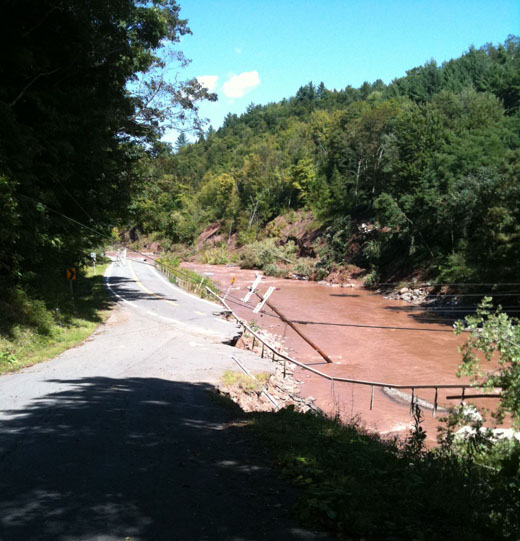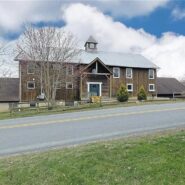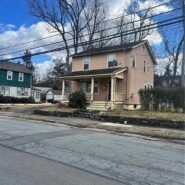The Weekenders: Preparing for an Emergency
Kim McGalliard | September 7, 2012
Route 42 in Lexington the day after hurricane Irene
Last week was the one-year anniversary of hurricane Irene (anniversary kinda seems like the wrong word for a natural disaster, but that’s what everyone else is calling it). For many people in NYC, it was a non-event. The city prepared for the worst, but beyond some minor flooding, there wasn’t any major damage. The story was the opposite for many parts of upstate and the Catskills. We left the city and came upstate because we thought it was going to be so bad in NYC. We ended up getting stranded upstate for four days after the storm due to several washed out bridges, a huge landslide and many, many washed out roads.
The morning of the storm, around 7:00 AM, the creek that borders our property had turned into a raging torrent – the kind where when we stood next to it, we could hear the rocks and boulders crashing into each other. There was two and a half feet of water in our basement, but we didn’t have any damage to our house or property. Other people around us and in nearby Prattsville lost everything. Two main things we realized: first, we were very lucky, and second, we were very unprepared for any sort of emergency.
The day before the storm was hot and muggy. I picked blackberries and made jam. We put the BBQ and the lawn chairs in the barn in case it got windy. We filled some buckets with water to flush toilets if the power went out. We got out the candles and went searching a few local hardware stores for lamp oil because we were almost out. We couldn’t find it anywhere because everyone had gotten there before us.
Looking back (and looking forward) there are several things we did and more things we’re planning on doing to prepare for future emergencies:
1. Get a generator: The hurricane happened in the summertime which meant that our main issue with loss of power was no water from the well and no power to the refrigerator/freezer which meant all of our food would spoil. Many of our neighbors were in a similar predicament, and despite the gravity of our collective situation, we went to several ‘hurricane parties’ which were really pot-lucks where people were sharing/getting rid of food they knew was going to spoil. We met a lot of new people and made a lot of new friends. Had it been winter, and been a big snowstorm that knocked out the power for a week, we would have been in far more dire circumstances. Without electric power, our oil boiler doesn’t heat our house which would mean frozen pipes and hundreds (if not thousands) of dollars worth of damage. We’ve resolved to get a generator – but not one of the portable gas ones that means you have to be around to start it up when the power is off. We’ll be getting one of the automatic propane powered ones that turns on automatically if there is a power outage and powers the essential systems of the house: heat, water and select electrical appliances like refrigerators and freezers. They aren’t cheap, but we’re hoping to organize a package deal with some of our neighbors. I’ll post back with details on cost (unfortunately won’t be cheap) and timing.
2. Have the basics ready – lights, water, food: Keep flashlights and headlamps around with spare batteries. Mr. Sticks has a collection of hurricane lamps, which not only provide nice and consistent light, but also are safer than candles. Some people fill up their bathtubs with water if they think the power is going to go out, primarily for having water to flush toilets. We got out our rain barrel and used water from there as well as buckets we’d filled. For drinking water, keep bottles stored, or like we do, and if you have time to prepare, get a big water cooler and fill it with water. Luckily we have a propane (gas) stove, so cooking wasn’t a problem. If you have an electric stove, it might be worthwhile to get a camp stove that uses propane or prepare to use your wood stove if you have to.
3. Heat: This is a big one for us and is the main reason that we’re doing number 1 – getting a generator. Obviously in the summer, this isn’t an issue, but in the winter, especially if you aren’t at your house full-time where you can stoke up the wood stove, being able to keep your house above freezing so your pipes don’t freeze is a major issue. We have a fireplace insert, but it doesn’t heat the entire house, especially the kitchen. We’re hoping at some point to be able to put a wood stove in the kitchen part of the house, but until then, we NEED to be able to turn on the heat to keep things from freezing, which means getting a generator.
4. Communication: When the storm happened last year, our town didn’t have a specific emergency plan. With electricity out, and phone lines dead, the fact that we can’t get cell phone service in our area became a distinct disadvantage in an emergency situation. We couldn’t get in touch with family or work to let them know that we were stuck but alive and OK. When they had to close the bridge at the end of the road – the only way in or out – they had the fire department driving up and down the road telling people what was going on, but many people didn’t get the message and got stuck on the wrong side of the bridge without a car. I don’t really know what to recommend in this situation for how to plan for this except to say keep your cell phone charged, and if you can, find a place where you can get a cell signal, even if it’s weak. We did manage to find one place, at the end of the road, where if you stood by the big willow tree on the side of the road, you could get an AT&T signal. If you don’t regularly get cell service, try to locate these hot spots near you. If you can, get involved in your local town government and suggest they put together a plan for how to notify neighbors and residents in emergency situations when phones aren’t available.
5. Insurance: We actually have flood insurance. We live next to a creek and even though we aren’t technically in a ‘flood zone’ the price was reasonable and we thought it was a good idea. We actually need to replace our boiler, so we were kind of hoping that the two-and-a-half feet of water in the basement had caused some sort of damage. But of course, after getting it checked out by our oil company, the boiler fired right up and worked all through the winter. In general, I hate the idea of insurance – paying lots of money for something that MIGHT happen. But really, if it does happen, and if you have insurance, it really makes a difference.
6. Neighbors: When the storm happened, we had only been in our house for six months, so we didn’t know that many people. The day after the storm we walked down the road to assess damage in the area. We met a lot of people who were out doing the same and in the process met a lot of people who have since become our friends. In rural areas with limited access to services that city people take for granted (police nearby, 311, doormen and security guards) it is really important to get to know your neighbors and be willing to help them out if they need it. Our neighbors did a lot for each other – getting gas for generators, filling in washed out driveways and roads, providing food for people working to help others or who were stuck away from home. My hope now is that when the next situation happens, we’ll be in a position to help our neighbors in ways we saw them helping others.
Too read some flood stories, check out the Watershed Post series on Faces of the Flood as well as the feature in New York Magazine that recounts the flood in Prattsville in moving detail.
Read On, Reader...
-

Jane Anderson | April 1, 2024 | Comment A Westtown Barn Home with Stained-Glass Accents: $799.9K
-

Jane Anderson | March 25, 2024 | Comment A c.1920 Three-Bedroom in Newburgh: $305K
-

-

Jane Anderson | January 30, 2024 | Comment A Renovated Three-Story Beauty in Poughkeepsie: $695K
